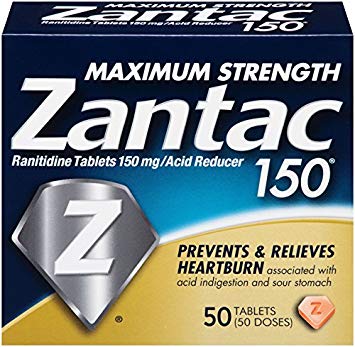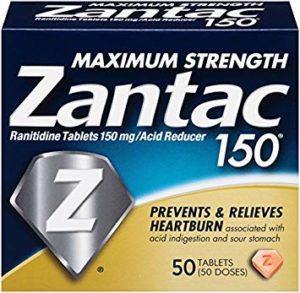 Zantac makers are being investigated by the U.S. Department of Justice. New commission filings reveal that the DOJ is investigating Sanofi-Aventis US LLC and GlaxoSmithKline LLC over allegations that Zantac, a heartburn drug, causes cancer. The DOJ and the U.S. Attorney’s Office are looking closer to see if these companies violated the False Claims Act. Zantac lawsuits filed by plaintiffs’ attorneys have charged that the Zantac makers concealed what they knew about NDMA contamination of their product.
Zantac makers are being investigated by the U.S. Department of Justice. New commission filings reveal that the DOJ is investigating Sanofi-Aventis US LLC and GlaxoSmithKline LLC over allegations that Zantac, a heartburn drug, causes cancer. The DOJ and the U.S. Attorney’s Office are looking closer to see if these companies violated the False Claims Act. Zantac lawsuits filed by plaintiffs’ attorneys have charged that the Zantac makers concealed what they knew about NDMA contamination of their product.
The probes began in July 2020. Around that same time, the New Mexico Attorney General filed a suit against multiple Zantac makers for violating the False Advertising Act, the Unfair Practices Act, and other laws.
Zantac MDL
Zantac cases have been consolidated in Florida in a federal multi-district litigation court. At the same time, attorneys for 40 plaintiffs in California are also seeking to have cases consolidated in that state.
Zantac is believed to raise the risk of cancer, including testicular, bladder, prostate, kidney, and thyroid cancer. The claims also allege that Zantac manufacturers have known about the drug’s potential to cause injuries since the 1980s. Petitions also claim that some Zantac makers even worked to shut down those studies.
Zantac manufacturers continue to deny claims that their heartburn drug causes cancer. They claim there is no causal link between Zantac and cancer.
History of Zantac and Ranitidine
Zantac was developed by Glaxo, now known as GlaxoSmithKline (GSK). It was approved for prescription use by the FDA in 1983. Zantac belongs to a class of medications called histamine H2-receptor antagonists (or H2 blockers). Drugs in this class are designed to decrease stomach acid. They are used to treat gastric ulcers, heartburn, acid indigestion, sour stomach, and other gastrointestinal issues.
Zantac was the world’s best-selling drug in 1988. In the fiscal year that ended in June 1989, it accounted for more than half of Glaxo’s $3.98 billion in sales. As recently as 2016, Zantac was the 50th most prescribed drug in the U.S., with more than 15 million prescriptions. The marketing strategy that led to Zantac’s success for 30+ years emphasized Zantac’s supposed safety. Its makers marketed Zantac as a safe and effective treatment for infants, children, and adults.
In 1996, Zantac became available without a prescription. The next year, generic versions became available.
On September 13, 2019, in response to a citizen’s petition filed by Valisure, Inc., U.S. and European regulators stated that they were reviewing the safety of ranitidine.
Five days later, Novartis AG’s Sandoz Unit, which makes generic drugs, stated that it was halting the distribution of its versions of Zantac in all markets. Canada then requested drug makers cease selling ranitidine.
Zantac Recalled from Stores
On September 28, 2019, CVS Health Corp. announced that it would stop selling Zantac and its own generic ranitidine products out of concern that it might contain a carcinogen. Wal-mart, Walgreens, and Rite Aid Corp announced that they removed Zantac and ranitidine products from their stores.
On October 2, 2019, the FDA stated that it was requiring all the makers of Zantac and ranitidine products to conduct testing for NDMA. FDA also announced that preliminary tests indicated unacceptable levels of NDMA.
On October 18, 2019, Sanofi recalled all of its over the counter (OTC) Zantac products in the U.S., including Zantac 150, Zantac 150 Cool Mint, and Zantac 75.
Failure to Warn
Zantac lawsuit petitions allege that at no time did any defendant that sold Zantac attempt to include a warning about NDMA or any cancer. Zantac defendants had the ability to unilaterally add an NDMA and/or cancer warning to the Zantac label (for both the prescription and OTC forms) without prior FDA approval pursuant to the Changes Being Effected regulation.
The petitions also argue that if the defendant had attempted to add an NDMA warning to the Zantac label (either for prescription or OTC), the FDA would not have rejected it.
RELATED
- Zantac Cancer Lawsuit Lawyer
- Zantac Lawsuit filed for Woman with Leukemia Cancer
- FDA orders Zantac Heartburn Drug Recall
- FDA pulls Zantac Late
- Zantac Makers Being Investigated by DOJ
- Zantac Recall Cancer Scare

by Matthews & Associates




